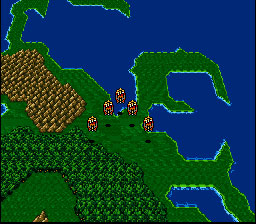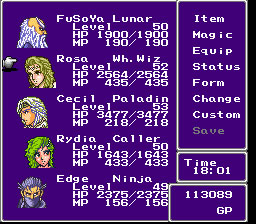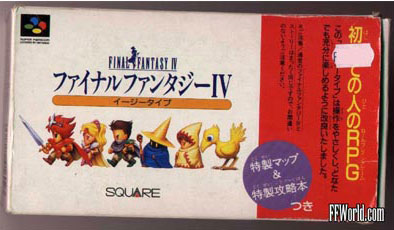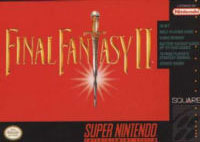The Greatest Games of All Time: Final Fantasy II
Take a trip down memory lane as we embrace Final Fantasy II as one of the greatest games of all time.
Sail to the Moon
Final Fantasy II
Platform: SNES | Genre: Role-PlayingPublisher: Square Enix | Developer: Square Enix | Released: 1991
It's not an exaggeration to say that Square Enix's Final Fantasy series of role-playing games rates as one of the strongest entertainment franchises in the world. You'd be hard pressed to name another RPG series that can match Final Fantasy's breathtaking computer-animated FMV sequences, fantastical steampunk environments, gorgeous musical scores, and enormous, pristine worlds that practically beg for exploration. This is the series that introduced the now-trite concept of the airship to the gaming masses, after all.

All of these elements are truly great, yes, but perhaps the Final Fantasy series' most important innovation has been in storytelling. The characters are believably human (even the nonhuman ones)--they get scared, play jokes on one another, and even get married. Although the world's always on the brink of destruction in Final Fantasy, the path to preventing the catastrophe is usually convoluted and filled with twists and cul-de-sacs, like a great fantasy novel. And the dialogue is consistently top-notch, from the everyday banter around the towns to the villains' soliloquies. The storytelling prowess didn't start with the original Final Fantasy, though. In its day, the game was more comparable in its construction to leading RPGs like Dragon Quest rather than to something completely groundbreaking. No, the revolution that created the rich RPG genre that millions of fans adore today began with the release of Final Fantasy II (Final Fantasy IV, in Japan). Together with Phantasy Star 2, Final Fantasy II invented the modern, story-driven RPG simply by making players care about what happened to their characters. This is why it deserves to be called one of the greatest video games of all time.

The narrative in Final Fantasy II gripped you and shook you like a rag doll right from the beginning of the game. Your introduction to the protagonist, Cecil, took place on the deck of a military airship that had been ordered to extort a magic crystal from an innocent town (not a very heroic vocation). After his complicity in this war crime, the conscience-wracked Cecil was dismissed from the military and sent on an errand to a nearby town, along with his best friend Kain. Using generic archetypes for characters (like Final Fantasy's White, Black, and Red Mages, for instance) was standard operating procedure in RPGs at the time, but Final Fantasy II went off on a far more interesting tangent.
You played a washed-up veteran with a tortured past, and the game quickly introduced you to a multitude of characters with different backgrounds, motivations, and abilities. Each character had unique combat abilities that fit together into a cohesive whole, like Kain's jump attack and Cid's peep. Furthermore, every character kept his or her own counsel during the course of the adventure. Some left the party at an important juncture in the story, only to return at an unexpected moment. Other major characters were simply, shockingly written out of the lineup. Was Kain firmly on your side, and, if so, why was he acting so erratically at times? What about Edge, the mysterious ninja? Did the game's chief bad guy, Golbez, really mastermind the evil plan you were trying to defeat, or was there some other, ulterior force at work?

You simply didn't know the answers, and there was only one way to find out: fly to the moon on a spaceship that looked like a gigantic whale. This memorable sequence was only the most grandiose in a long line of in-game breaks for story advancement, which are now referred to as cutscenes. Some of them, like the noble sacrifice of the Magi Twins, Palom and Porom, were particularly poignant, while the epic-staged battle right before the end of the game was just awe-inspiring. Compared to other Super Nintendo games from 1992, Final Fantasy II was a feast for the eyes and ears. Nobuo Uematsu's gorgeous, haunting MIDI scoring was completely peerless, and the game did a lot of fancy work with the SNES's Mode 7 scaling technology, too. That Meteo attack looked like it hurt.
In Final Fantasy II, your characters weren't dumb marionettes; they were full-fledged actors and actresses, and they delivered knockout performances. By the time you finished the game, you had developed such an affinity for your band of heroes that you actually wanted to see what happened to them after they defeated the final boss. And the game obliged with a sort of "where are they now?" trailer during the credits, which was another innovation in a game full of novelties.
The Final Fantasy series has already chalked up a Greatest Game of All Time, and it will surely contribute more entries to the list over time, thanks in part to the quantum leaps Square made in Final Fantasy II. It was with this game that Square assumed the pole position in the console RPG market--a position it has never relinquished. We, and the Kingdom of Baron, are the better for it.
-- Steve Palley
Got a news tip or want to contact us directly? Email news@gamespot.com


Join the conversation